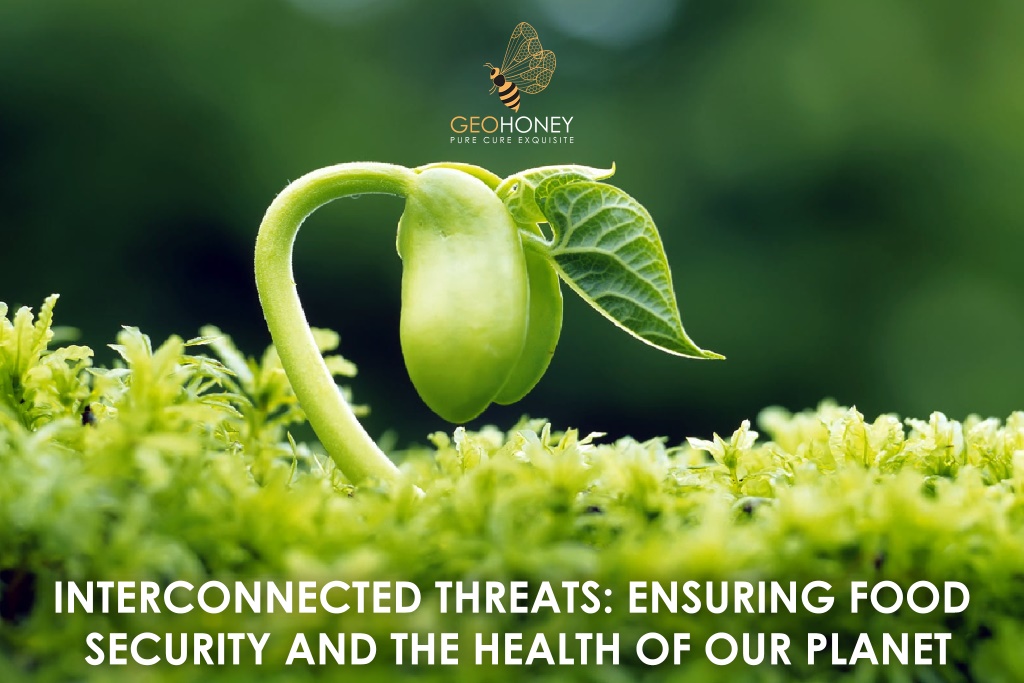- Tokyo: 10:31
- Singapore: 09:31
- Dubai: 05:31
- London: 01:31
- New York: 20:31
Interconnected Threats: Ensuring Food Security and The Health of Our Planet

In a world grappling with environmental challenges and increasing population, the concept of interconnectivity has become crucial for maintaining both food security and the health of our planet. The intricate web of relationships between agriculture, climate change, biodiversity, and sustainable practices offers a promising path towards a brighter future. By recognizing and understanding these interconnected threads, we can make informed choices to ensure a sustainable and secure food supply while safeguarding the well-being of our planet.
Climate Change and Agriculture
Rising temperatures, extreme weather events, and changing rainfall patterns, exacerbated by the depletion of the ozone layer, are not only threatening crop productivity but also destabilizing food systems globally. Acknowledging this multifaceted connection allows us to develop adaptive strategies that address these intertwined challenges. By promoting the cultivation of resilient crop varieties, implementing precision agriculture techniques, and adopting sustainable water management practices, we can enhance the resilience of our agricultural systems and mitigate the impacts of both climate change and the depletion of the ozone layer.
These proactive measures are essential in safeguarding our food supply, protecting human health, and preserving the delicate balance of ecosystems on our planet.
Biodiversity and Food Production
The delicate balance of ecosystems and the multitude of plant and animal species contribute to pollination, natural pest control, and soil fertility. However, industrial agriculture practices and deforestation have led to the loss of biodiversity, endangering our food supply. Embracing agroecological approaches, conserving natural habitats, and supporting small-scale farmers can restore biodiversity and enhance food security simultaneously.
Sustainable Agriculture and Ecosystem Health
The health of our planet's ecosystems is intricately linked to sustainable agriculture and minimizing our carbon footprint. Pesticides, synthetic fertilizers, and monocropping not only degrade soil quality and pollute water bodies but also contribute significantly to increased greenhouse gas emissions, thereby amplifying our carbon footprint.
However, embracing regenerative practices such as organic farming, crop rotation, and agroforestry can simultaneously revitalize soil health, sequester carbon, and promote water conservation. By adopting these sustainable practices, we not only ensure the long-term viability of agriculture but also actively reduce our carbon footprint, mitigate the impacts of climate change, and preserve the delicate balance of ecosystems for future generations.
Food Waste and Resource Efficiency
Addressing food waste is a critical element in securing food supplies and achieving environmental sustainability while tackling CO2 emission. Astonishingly, around one-third of the food produced worldwide goes to waste, contributing to unnecessary resource depletion and greenhouse gas emissions, including CO2 emission. To combat this issue, it is imperative to establish efficient food supply chains, encourage conscientious consumer behavior, and back initiatives aimed at redistributing surplus food.
Effects on Our Planet
The effects are already being felt around the world, with the rising earth temperature at the core of these challenges. In 2019, climate change was a factor in the food crises in Ethiopia, Somalia, and South Sudan. These crises left millions of people hungry and displaced.
The effects are expected to get worse in the future. The Intergovernmental Panel on Climate Change (IPCC) estimates that by 2050, climate change could reduce global crop yields by up to 20%. This could lead to widespread food shortages and hunger. Climate change is one of the most pressing issues facing our planet today. The earth temperature is rising, and this is having a major impact on our food supply.
The Challenges We Have
Rising temperatures are making it harder for crops to grow. Plants need a certain amount of heat to grow, but too much heat can damage them. Rising temperatures can also lead to droughts, which can further damage crops.
Changing rainfall patterns are also making it difficult to grow crops. Farmers need to know when and where it will rain in order to plan their crops and water them properly. But changing rainfall patterns are making it harder to predict when and where it will rain.
More extreme weather events, such as floods, storms, and heat waves, are also damaging crops and livestock. These events can also make it difficult for farmers to get their crops to market.
There are a number of things that can be done to mitigate the effects of climate change on food security. These include:
- Reducing greenhouse gas emissions
- Investing in sustainable agriculture
- Developing drought-resistant crops
- Improving water management
- Providing food assistance to those who need it
By taking these steps, we can help to ensure that everyone has access to safe, affordable, and nutritious food, even in the face of climate change.
Conclusion
Recognizing and addressing the interconnected threads of food security and the health of our planet is a fundamental step towards building a sustainable future. By considering the relationships between climate change, biodiversity, sustainable agriculture, food waste, and consumer choices, we can foster a holistic approach that ensures both our nourishment and the well-being of our environment. Together, we can weave a tapestry of interconnected actions that will lead us towards a more resilient, equitable, and sustainable food system for generations to come.



